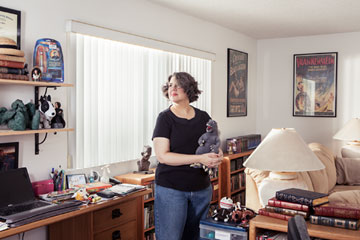
Myers, in her office in Fullerton, Calif., now writes books about the autism spectrum.
(4 of 4)
Then he was ready for the creative leap: "Every instrument had a distinct pattern ... With practice, I learned how to distinguish a passage played on an organ from the same music played on a guitar." He could "see" the sound waves and identify their idiosyncrasies, allowing him to design guitars and amplifiers of unprecedented subtlety.
This same sort of progression from bottom-up details to associations to creative breakthroughs led me to innovations in animal welfare that have greatly improved the cattle industry--for instance, curved cattle chutes, which take advantage of the natural behavior of cattle to go back to where they came from. The same progression led Myers from writing code to writing particularly insightful books about the autistic experience. For her, switching to nonfiction was just like learning a new computer language. "Download the data," she says. "Translate it into human."
I'm certainly not saying we shouldn't work on deficits. But the focus on deficits is so intense and so automatic that people lose sight of the strengths. I recently spoke to the director of a school for autistic children, and she mentioned that the school tries to match a student's strengths with internship or employment opportunities in the neighborhood. But when I asked her how the school identified the strengths, she immediately started talking about how they helped students overcome social deficits. If even the experts can't stop thinking about what's wrong, how can anyone expect the families who are dealing with autism to think any differently?
For me, autism is secondary. My primary identity is as an expert on livestock. Autism is part of who I am, but I won't allow it to define me. Some people's difficulties are simply too severe for them to ever have the same opportunities I have. But for so many people on the spectrum, identifying their strengths can change their lives. Instead of only accommodating their deficits, they can cultivate their dreams.
Adapted from The Autistic Brain by Temple Grandin and Richard Panek (Houghton Mifflin Harcourt, 2013)
